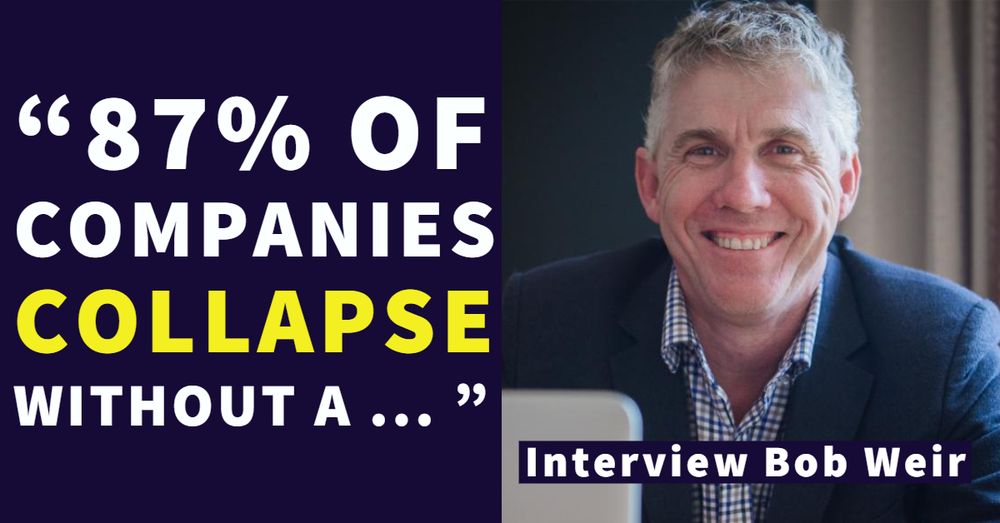
Why New Zealand Import Businesses Fail and Tips on How You Can Avoid It
15-minute read (25-minute watch)
You Will Learn:
- Why do most organisations collapse?
- How did the leaders of the popular companies make decisions that triggered the breakdown of their business?
- And other practical tips you can implement today!
Max: Hello. Today we are going to talk about why New Zealand import businesses fail and tips on how you can avoid it. Our guest is Bob Weir who is a business adviser with 30 years of business experience.
He has recently published another book called “Why businesses fail and a journey through our irrational minds”. He was also featured in New Zealand Herald, Radio New Zealand and other media websites.
Today you will learn why Pumpkin Patch Limited collapsed, how the leaders of the popular companies made decisions that triggered the breakdown of their business and other practical tips you can implement.
Bob, would you like to add anything else about yourself or your business?
Bob: Thanks, Max. I have been in business for a long time. However, in more recent months and years, I have done a lot of research trying to expand my understanding a bit more about how to be successful in business.
Max: What made you write this book now?
Bob: I have written a couple of other books and enjoyed the process of researching and learning information and then sharing it.
But I had a particular interest from my advice to other businesses and running my own business. This is that how we can do better at it.
I came at it from a different angle. I learnt from the people who went very wrong. I started with a small amount of information that grew as I did more research and ended up being another book which took me about four years to produce.
Thus, I commenced with a desire to learn more about why a lot of businesses got into many troubles in New Zealand.
Max: Was anything that you did not expect what you discovered?
Bob: When I started out using my business experience and training I was looking at more traditional things such as growing too fast, borrowing too much money, cash flow issues and all that sort of things.
What I found more, I looked at it was not a lot of common threads. There were a lot of things that happened, but they were not the same in all cases.
The only thing that was the same was the human being and the fact that these businesses were led by people that made some pretty strange decisions. That is what led me on a path to the psychology.
Hence, the second part of the book title is our irrational minds. So that was a piece I was not expecting.
But I promised that a fair amount of time I was looking at how we make decisions and why we get so many decisions wrong when even we have time we should have known better.
The journey was to study the human mind as much as I did about the business itself.
Max: I had a question from one of our clients. He asked that some social media influencers and business advisors say that one of the best ways to get new clients and make your business successful is to get referrals.
Do you have any tactics or a specific example how we get these referrals? Because it is easier said than done, is not it?
Bob: There is no doubt that throughout the world the best marketing tool that any business can use on the planet is to get a referral by a trusted source.
If a person you know recommends you to use a business or buy a product from someone, you will trust them in any other forms of marketing. That what everyone is aiming to achieve is to get referrals.
The most critical thing getting referrals is when you work. I always use the argument that the best marketing you can do is to do a great job every time.
If you work well, you have excellent customer service and sell a product. That is worthwhile and useful, and people want to do it because their words spread.
It does not matter what marketing you are using. If you are not doing a great job every time, you will not get referrals because people will not say good things about you. That is a very critical thing.

Unfortunately, when you start out a small business, you can not afford to rely on referrals because you do not have enough customers. So, you have to do a lot of proactive marketing.
I think there is no simple answer. The whole battle we do is that we have to market ourselves, get networking and have meetings with people.
When we get a chance to do a job for someone to provide service, produce and sell a product we have to do it very well. If we do not do that, the referrals will not come.
Max: What are the signs that business is about to fail?
Bob: It is a very good question, and it is one that comes up all the time. The first thing that is very rarely is a sudden, particularly for the bigger businesses.
If you run a small business, things can go wrong a lot quicker because you are smaller and you do not have the cash to get out of a problem faster.
Some people did not take notice of the signs and do something about it.
The first thing that you will see in any businesses that are getting into trouble is issues around cash. It is usually not the cash that causes the problem.
Something else is happening in the company to get into that situation.
It will be when you are starting your struggle to pay the bills, to manage your tax, you have got creditors chasing you, and you can not find the money to pay them. Why is this challenge happening?
As soon as you start to struggle with paying the bills, meaning your requirements with the banks, paying your creditors on time, and you do not know why you need to stop very quickly and work it out, then it will happen a lot quicker in a small business and it is harder to get out of it.
You should always look at the cash because if you are struggling with that, it does not matter how good everything else is, things can happen a little quicker than you would like.
Max: I have read your book and noticed one interesting statistics. You were saying that 75% of the failed businesses had a single director and a few 12% had family-related directors that could be a married couple or family members.
Meaning, nearly 90% of failed businesses had a single director or was run by a family. If we put it into numbers out of the hundred companies that would be 90% failed and 10% succeeded that had an unrelated business partner.
Would it be correct to say that if you have a separate business partner, you are nine times likely to succeed than you have a single director?
Bob: The statistics that you have shown me initiative was over the thousand business liquidations.
In most of those small businesses with a single director or a mum and dad, it is far more common that a small business is likely to fail proportionately to the big guys.
The big companies fail because they are bigger and there are a lot more money and people involved. If the business is further small and a lot of times people are isolated on their own, they seek help.
When you are very emotionally attached it, you often do not see what others will see. Thus, there is another key thing I found it before I wrote the book.
Business can be very lonely, very hard and we do not know everything. Anyone who thinks that knows a business does not, even if one has its experience.
Having people around you, that can advise you is very important because it gives some other perspectives.
When you come to make those big decisions that can go wrong someone will say whether you have thought about this or you think that is the right thing to do.
I believe your correlation is quite an interesting one. There is some real truth in that, but I have not put out exactly.
The statistics show that small businesses are more likely to fail and they are usually families and directors on their own.
If you are on your own, you are going to be more likely to get into trouble. Thus, you should always seek help and never speak that you know it all because none of us does.

Max: We have another question from Alex. He is asking about how will business owners benefit if they read your book?
Bob: There are a few things. It is quite interesting to learn from the mistakes of other people. In some ways, it is a kind of interest we have as human beings. We like to watch other people, do things badly.
There are a lot of case studies there. There is much information that I collect together at the end of the book to say if you want to be successful based on learning from other mistakes these are the things you should look to do.
However, a few other key messages from the book is not only about the basics of business. It is about understanding yourself and the limitations we have as people and the mistakes and the decisions we make.
There are a lot of insights into the limitations of our “cognitive bias” as we call.
You should stop and think about what the biases that we have towards meeting people, the biases that we have about information and how we interpret that and the biases that exist within us.
There is a lot of information in the book about the psychology of how business people and human beings work. I have written in the style that is accessible to anyone.
I do not think you need to be a business person to read. One of the companies like Pumpkin Patch Limited was quite high profile and a lot of stuff in the media that some were true and some were incorrect.
Thus, it is a bit more facts behind why this happens.
Max: Bob, we discussed reasons why businesses fail such as cash flow or you do not have a business mentor or business advisor. What are other things that can make you succeed?
Bob: I am talking to the people who are in a small business. The first thing if you are doing business you have to enjoy it because business is pretty tough and you have to get some reason to get out in the morning and take delight in it.
You have to pick something and if you find it, you do not like it anymore. Eventually, that lack of passion is going to impact on the financials of the business itself because you will not put in the same effort in.
You will get sloppy on those things. You are going to test whether you enjoy doing it or not. If you do not, you get in any trouble, whereas if you enjoy, you have got some meaning out of it.
Therefore, the one thing is testing. If it is what you want to do that is a good start.
Then, you are going to start to think about if it is clear what you are going to do with your business and why and what you are trying to achieve out of this.
You should start to look a bit further into the future because if you are not, you will waste time and probably will not get where you want to go.
You have to stop and look at the big picture and start drilling down into the little things, for example, whether you want to grow, where and how and what risks you are prepared to take.
The next thing is that if you are in a small business, for example, and you want to grow. The things you need to get bigger are staff and money.
You need to ask yourself whether you like employing people or not. If you do not like it, you are probably going to struggle because you need staff.
The next big one is a way to get money from because most Kiwi businesses do not have enough cash that undercapitalised. The only place you can usually get it is from the bank.
So, are you prepared to borrow money? If yes, what risks do you have to take? Then, you have to borrow against your home.
If you do that, are you prepared for the risks of that? If things go wrong, you might lose your home. However, a lot of us have to borrow against our home.

Next, you start to develop that and look at your systems and processes and at marketing to the right people coming back to your point before getting some referrals about where you are going to get your business from.
You start to break it down into all aspects of the company. There was another key message for me that there are a lot of little things you have to do well.
It means not always to make good decisions but also do small stuff well from day to day.
Max: Bob, it is no secret to anyone that in 2018 you had a digital presence on the different social media. It is still a fact that many businesses do not have a website.
The last time I have heard 50% of New Zealand businesses do not have a website. Why do small businesses not have it? Why do they not do the basics?
Bob: This comes back to my point about the psychology of us as human beings.
It is that some common sense and rational thinking would say we have to have one, but sometimes we do not do the things that are good for us for some reason.
When I first started out advising other businesses, I did not need a website. This was probably seven years ago. Now I say to everybody you have to have an online presence.
If you do not, even if you do not sell online, people want to go and find out about you.
Now all of us are online looking to find out. If I have met you for the first time, I will go LinkedIn and see the background. I look at your websites and see what products you sell.
You have to have a strong online presence as a minimum. The reason people do not have it is that they think it is too expensive and they can not see the value for the money.
You have to spend money, and most businesses lack cash that always cut somewhere, and it is not always the right place. You should have a presence even a Facebook page. I am still a believer website.
You can get a very good website these days for not much money. Why do people not do it? Because they do not see the value in these things and do not ask to advise. Nevertheless, you need to be online.
Max: Most of our clients import goods from Asia to New Zealand, and there are a lot of competitors and similar companies.
If you are, you will start importing any product from Asia to New Zealand and have got around fifty other similar competitors. What are the first three things you would do to stand out to be competitive and to get this market?
Bob: The first thing if you start importing something and might make sure that what you are importing is going to be demand, you need some level of research. You start importing in a small level to assess the markets and get some understanding.
It has a bit risky. If you have not decided something imported without testing the market at all, you will be looking for something that you can not sell.
The first step is to do testing the market. In every business whether it is import or not, you have to be clear on this. You should know what the difference about you or your product is and what makes someone interested in.
When you start to see that it is clear what you are offering, whether it is a quality product or it is targeting on a specific market and whether you have access to something that others do not?
Consumers do not care about the person selling it. They only care about themselves and what in their benefit is.
You should tell me what benefits may in buying your product? If you can not find a difference, you are probably going to struggle between the others.
The danger with price is that if you have a small business, a price battle can end up that the small companies usually lose those battles.
Thus, you tend to find if you are a smaller importer competing with very big players, you probably need something out of the price unless you have access to something that very few others have.

Small companies usually lose in such battles because they just can not support low margins for too long. If you are looking at a price, you need to make sure you can sustain it and then look at your market.
Let is come back to a point about online, whether it is online marketing, direct engagement with your selling through distributors or retailers. That is how to get your important product to the end customer.
The first thing I sum up is to make sure that before you make a commitment, you do it at a scale that you can test the market. If you over commit, invest a lot of money what if it does not sell?
Can you answer that question? If you say that you start smaller and test the market and then grow, you can handle that. Make sure you have got it very clear who you are selling to and what their needs are.
Then, the route to market is direct to customers which is often more difficult to get through other distribution channels, retailers and so on.
Max: With getting a mentor and an advisor, at what point do you have to start thinking about it? Is it right from the beginning? Some of the services are not cheap because you are approaching a person with experience.
How do you decide what the third process the business owner has to take is and if it is going to be suitable or not?
Bob: When you are starting it out, I am trying to find the best advice you can afford, and when you first start, you probably can not provide much. Otherwise, this is getting good advice without having to spend any money.
For example, if you are starting on your own, join the chambers of commerce that might cost you a couple of bucks a year, join some networking groups because then you are going to surround yourself with like-minded people who you can get advice from their experiences.
So that you can get advice through those sort of channels as a starting point. If you know people in the business community that have personal friends or family, also tap into that sort of knowledge.
Make sure they are not only nice people. You should know what they are talking about because sometimes people can tell you things that do not help you.
The stage which you need to step up to that is probably getting bigger, and it is a lot when you can not afford it.
Getting a more formal mentoring relationship I have found myself because I do a lot of help for small companies that are starting out. However, I tend to do that for a free coffee to help people out.
The most often I get people is when they are slightly bigger. They might have a few staff members, more stable business, a regular cash flow coming in and have ongoing issues in the middle of changing their business.
I usually find at least some basic levels of capital cash behind you to be able to get some ongoing advice.
When I want to talk about prices from one point of view, there are some pretty good people out there that do not cost huge amounts. However, you need to shop around as well and try to find the best advice you can afford.
Max: I agree with you that one of the best ways to get advice is to use a website such as LinkedIn that there are different people you can join, or you can find some groups on Facebook. If people want to learn more about you and your services, how can they find you, Bob?
Bob: I have a website called “Pinpoint Business“. If you want to buy the books or look at, they are on a separate website “Why Businesses Fail”. The things you are doing is great now, Max.
This is another place people and small business owners can go to see a lot of high-quality free advice as well.

Max: Bob, thanks a lot for your advice and the interview and look forward to reading another book of yours later.
Bob: I appreciate this, Max. I think you are doing a fantastic job helping businesses out. Keep doing it, please.
P.S. We’d love to answer any of your questions! Contact us now. Do you know of other people that will find this article useful? Please share it on social media. Thank you!
